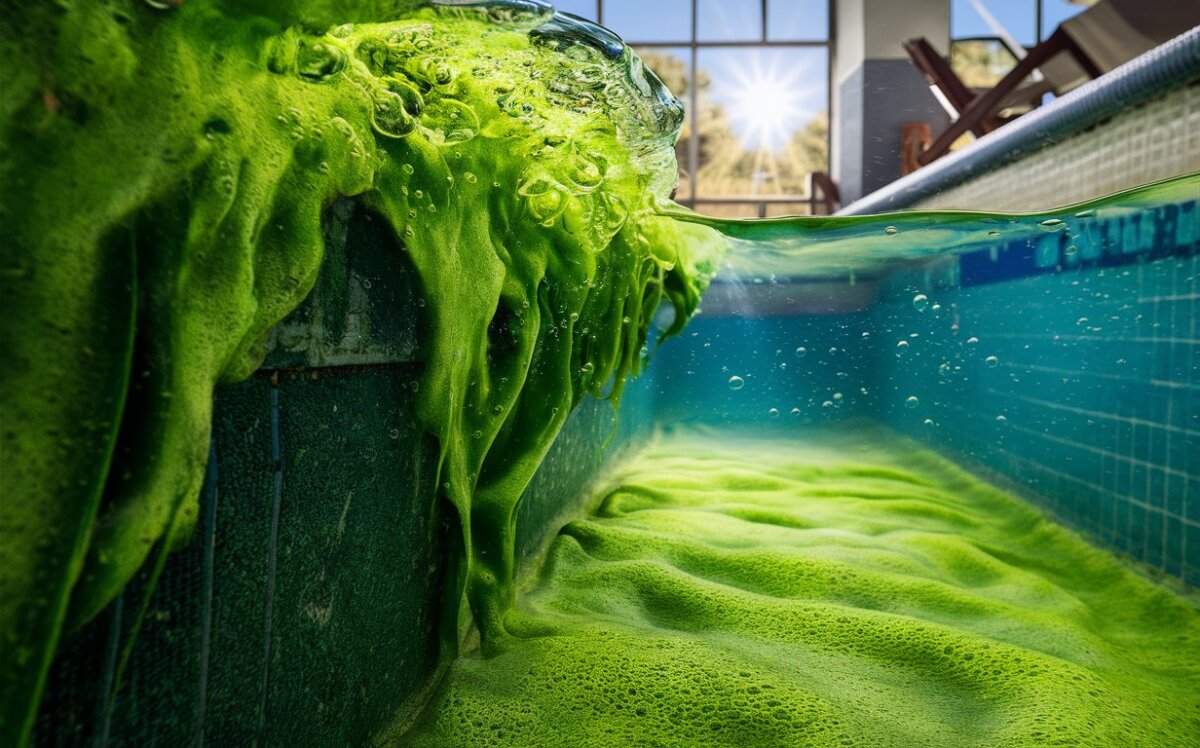Is pool algae harmful to humans, Are people harmed by pool algae? Revealing the Green Enigma, picture a warm, sunny day with a rising temperature and refreshing poolside air.
Although algae can grow in many different colors, the most common types are green, yellow, and black algae.
Even though these microbes appear harmless, their existence may put swimmers at risk for health problems.
For example, green algae can cause slippery pool surfaces and an unattractive appearance.
Typically found in gloomy regions, yellow algae can be particularly stubborn and resistant to conventional chlorine treatments.
Known for its gloomy, entrenched appearance, black algae can be difficult to remove and may need thorough cleaning.
Pool algae can cause a variety of health problems, from allergic reactions and skin irritation to more serious pulmonary problems.
Dolphin Premier Robotic Pool Cleaner
Particles of algae in the air or direct contact with tainted water can cause irritation and, in certain situations, disease.
Thus, keeping a swimming pool free of algae is essential to keeping it a fun and safe place to swim.
Prevention is the key to controlling pool algae. Regular maintenance procedures, such as adequate water circulation, frequent cleaning, and balanced chemical levels, can considerably decrease algae development.
Employing shock treatments and algaecides as preventative measures can also help avoid algae.
When algae have already gotten into the pool, treating it strategically is crucial.
Effective solutions include brushing afflicted areas, raising chlorine levels, and using specific algaecides based on the type of algae.
Frequent shock treatments can also help get rid of troublesome algae and stop them from coming back.
Pool owners can ensure that everyone has a clean, safe, and enjoyable swimming experience by learning about the subtleties of pool algae, taking preventative steps, and using targeted treatment methods.
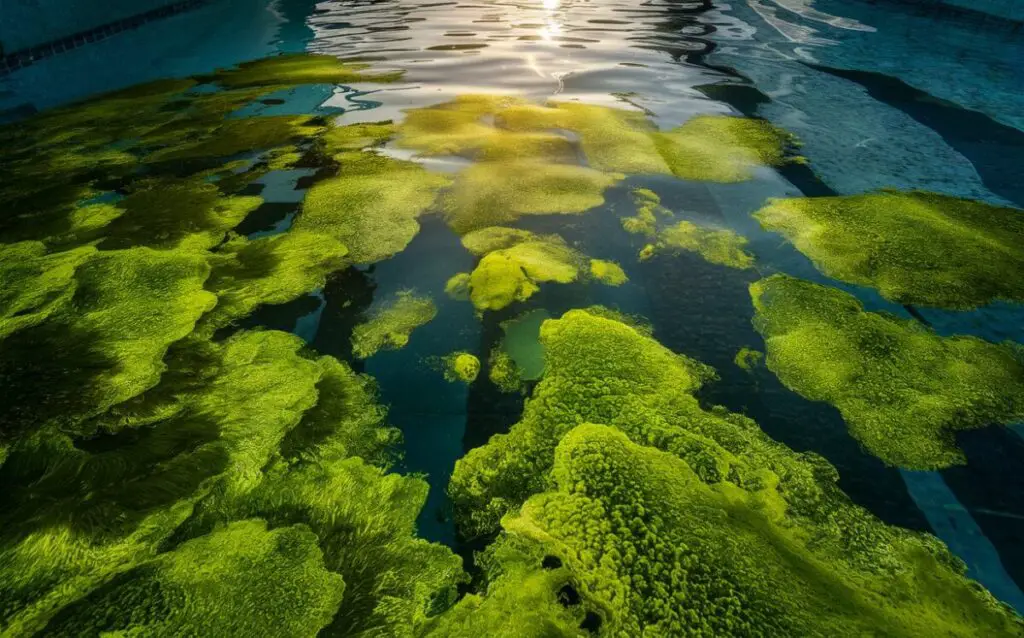
Types of Pool Algae
Algae in Green
Green algae is a common culprit that thrives in sunlight. Understanding its traits is essential to receiving the right care.
Algae in Yellow
A distinct set of difficulties arises from yellow algae, which frequently forms resistant layers on pool surfaces. Eradication requires an understanding of its special characteristics.
Dark green algae
Particularly tenacious in its attachment to pool walls, black algae poses a health hazard. Effective eradication depends on accurate identification.
Algae and mustard
Although less widespread, mustard algae can still be harmful to your health. To provide a tailored treatment, it is critical to understand its unique qualities.
Prior to delving into its possible effects on people, let us clarify what pool algae are. Aquatic habitats are home to algae, which are basic creatures resembling plants.
They might appear as brown, black, or green growths in pools. Green algae, often known as mustard or yellow algae, and black algae are the most prevalent forms of pool algae.
The risk to human health and well-being: The crucial query at hand is: Are pool algae toxic to people? Algae in pools generally do not directly endanger swimmers.
You might also enjoy this: Explore the Most Perilous Aquarium Exhilaration
Although swimming in algae-contaminated water can be uncomfortable, the aesthetic and texture characteristics outweigh the health risks.
It’s important to remember, though, that some algae create toxins, and breathing in these toxins over time can lead to respiratory problems, skin irritation, and redness in the eyes.
See https://aquaplanetview.com/wp-admin/post.php?post=87&action=edit for additional information.
Algae can also make a surface slick, which raises the possibility of slips and falls. Thus, even though the algae itself might not be dangerous, the environment it produces might be hazardous to people’s health and safety.
Is Pool Algae Harmful to Humans? Unveiling the Green Mystery
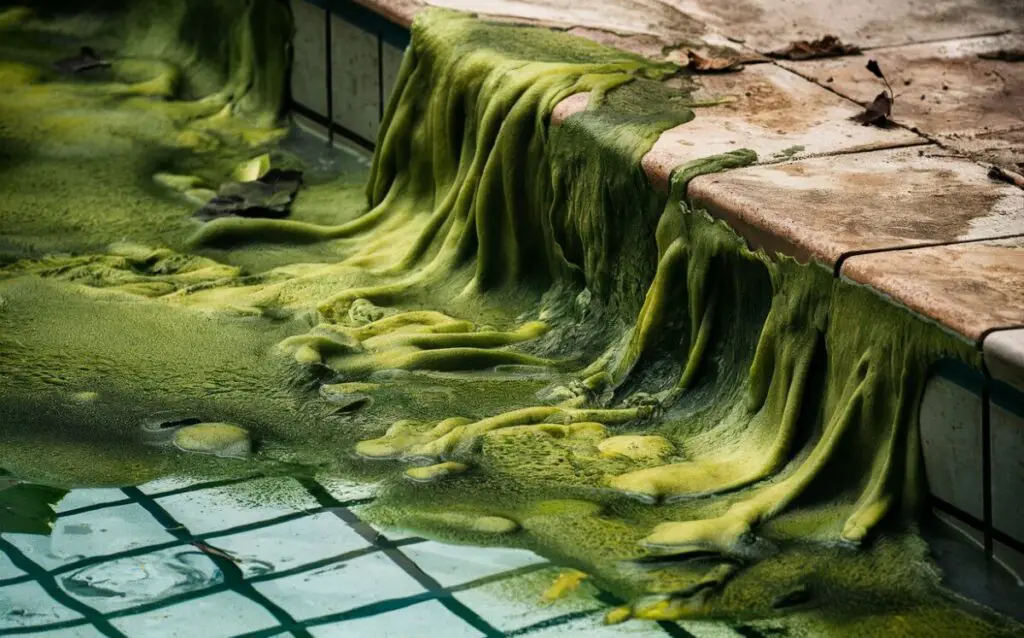
Health Risks Associated with Pool Algae
Furthermore, there are there are gastrointestinal issues and eye infections.
The algae’s toxins have the potential to cause negative reactions when breathed or come into contact with the skin. Extended exposure can potentially lead to long-term respiratory problems.
In addition, the existence of algae suggests low-quality water and improper upkeep, which fosters the growth of dangerous microorganisms.
To reduce these dangers, thorough cleaning, appropriate filtration, and routine testing are necessary. Taking care of pool algae not only improves the quality of the water but also protects against a variety of health problems, highlighting the need for preventive pool maintenance.
Prevention of Pool Algae
Apart from regular cleaning, maintaining a spotless pool necessitates careful consideration of water circulation, the use of efficient sanitation methods, and an ideal balance in the pool’s chemistry.
Consistent removal of debris and pollutants through filtration increases water clarity.
Using dependable sanitation techniques, such as chlorine or other appropriate agents, can inhibit the growth of algae and dangerous germs.
Achieving a balanced chemical equilibrium is essential for swimmer comfort and water safety.
Dolphin Premier Robotic Pool Cleaner
Regular testing and adjustment of pH levels, alkalinity, and sanitizer concentrations are necessary to maintain the health of an aquatic environment.
For a dazzling, clean pool, a comprehensive strategy that includes cleaning, circulation, and chemical balance is essential.
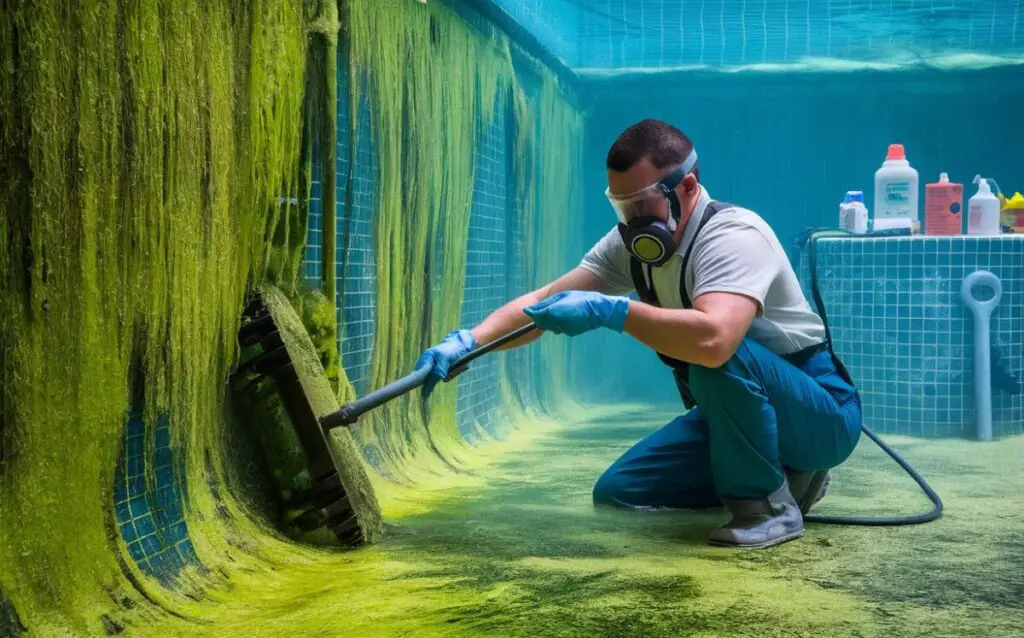
Treating Pool Algae
If there is an undesirable infestation of algae, quick treatment is required. Common techniques to address this problem include vacuuming, brushing, algaecides, and chlorine shock treatment.
Quick action can stop algae development and restore water clarity. However, getting professional assistance is crucial for complicated or persistent infestations.
Expert intervention enables the use of cutting-edge therapies specifically designed for particular species of algae, as well as a comprehensive assessment of the condition.
Experts have the knowledge and skills to identify underlying problems, provide focused treatments, and conduct continuous upkeep, providing a complete and efficient solution to protect your aquatic environment.
Signs of Pool Algae Infestation
In order to take prompt action, it is essential to identify the symptoms of pool algae. The first signs include a greenish tinge, slick surfaces, and water discoloration.
Algae may grow fast if left unchecked, transforming a beautiful pool into an ugly mess. In order to stop algae growth, it is critical to regularly check the pH balance and chlorine levels.
The installation of suitable filtration and circulation systems also contributes to maintaining water quality. Quick actions, such as applying algaecide and shock treatments, aid in the elimination of existing algae.
By being watchful and proactive, pool owners can ensure a dazzling, welcoming haven for everyone to enjoy during the swimming season.
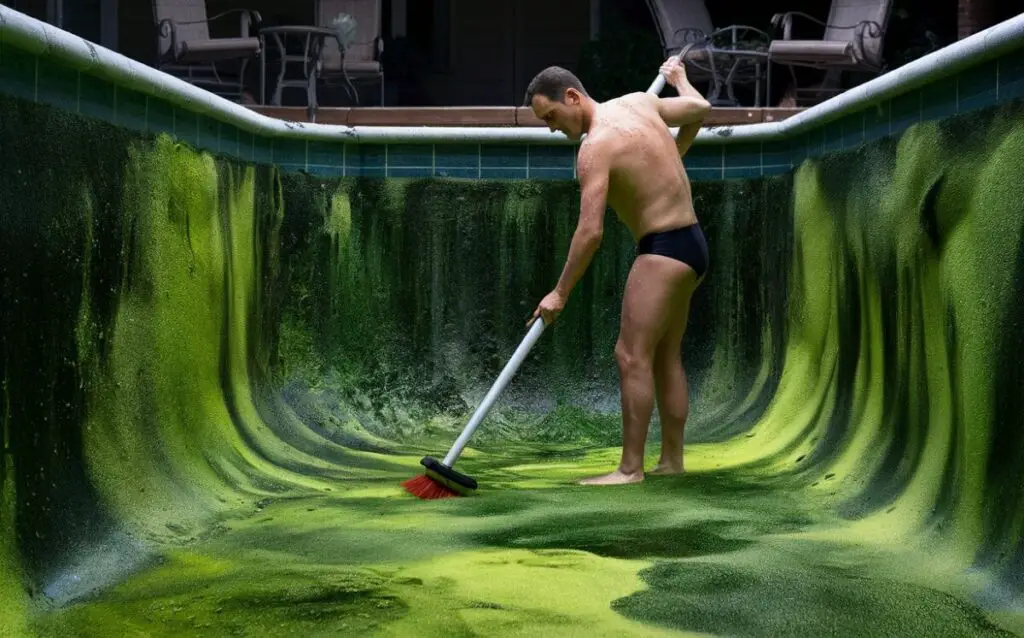
Common Pool Algae Myths
Preserving an immaculate pool. Algae can affect the quality of water and cause health problems, despite popular belief to the contrary.
Chlorine is an essential component, but it’s not a perfect solution; regular testing and appropriate filtration are just as important.
Understanding the diversity of algae species is critical because they all require different care.
Furthermore, algae can grow in even the most immaculate pools, highlighting how crucial regular upkeep is.
By busting these misconceptions, pool owners enable themselves to implement all-encompassing measures that guarantee a fun and safe swimming environment for everybody.
Real-Life Consequences of Ignoring Pool Algae
The negative effects of ignoring pool algae extend beyond the environment, affecting the peace of recreational areas.
Not addressing this issue can harm your health and finances.
Personal accounts highlight the heartbreaking stories of people suffering from skin irritations and respiratory conditions that are directly related to the uncontrolled growth of algae.
Furthermore, stories about outrageous costs for corrective actions serve as cautionary tales. Prompt and aggressive actions are necessary to lessen these effects.
Knowing the dangers of skipping pool maintenance makes routine watchfulness even more important, guaranteeing that financial responsibility and health are the norm in aquatic havens.

Maintaining a Healthy Swimming Environment
Regular pool water testing ensures the maintenance of the chemical balance, prevents the growth of harmful germs, and preserves water purity.
Expert inspections go beyond superficial assessments; they also guarantee adherence to safety regulations and address potential equipment issues.
Providing pool owners with the necessary maintenance knowledge encourages a proactive attitude by enabling them to identify issues early and take appropriate action.
By working together, we can protect swimmers’ health and increase the longevity of the pool’s infrastructure.
Dolphin Premier Robotic Pool Cleaner
By prioritizing these measures, the community fosters a culture of responsible pool ownership, creating enjoyable and safe swimming experiences for all.
Environmental Impact of Pool Algae
In addition to health issues, pool algae infestations have an impact on the environment. Sustainable pool management techniques are necessary due to the consequences of chemical runoff, water wasting, and their influence on nearby ecosystems.
Overusing water to treat algae depletes nearby water supplies, making scarcity problems worse.
Algalcide-containing chemical discharge can contaminate surrounding water bodies, endangering aquatic life.
It is essential to embrace environmentally friendly substitutes, like natural pool treatments and conscientious water management.
Using these techniques, pool management becomes more ecologically sensitive while also protecting human health and the fragile ecosystems in the area.
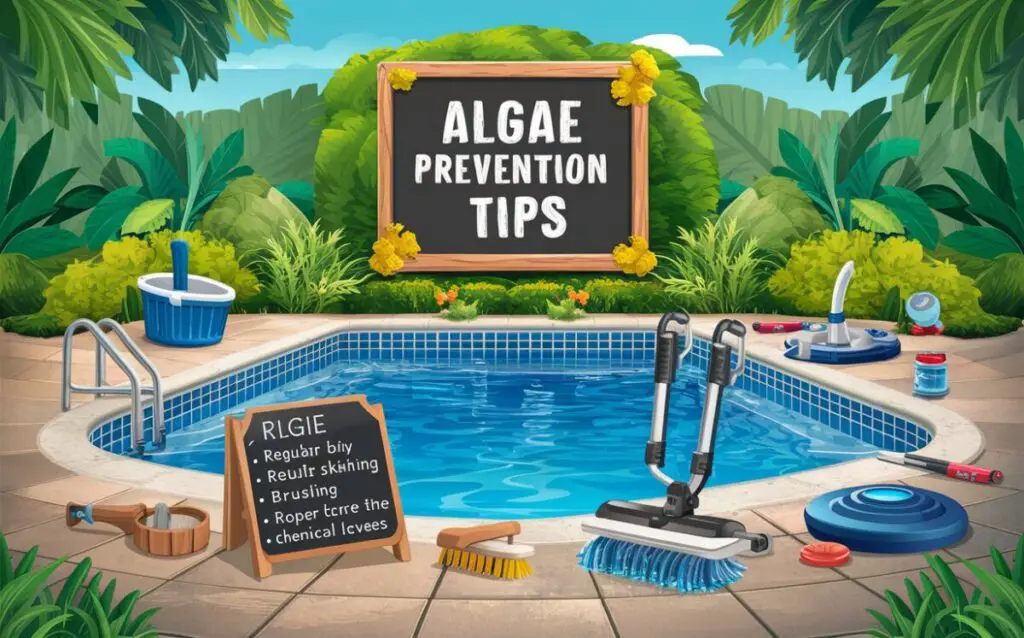
DIY Pool Algae Prevention Tips
To further protect yourself from algae, you must regularly check the chemistry of your water and maintain the ideal pH and chlorine levels.
Investing in algaecide treatments and routinely brushing pool surfaces provide an additional layer of defense.
Furthermore, think about adding helpful microorganisms that naturally oppose algae. Prioritizing adequate circulation and aeration improves water quality overall.
Remain vigilant by clearing garbage as soon as possible and reducing the nutrients that feed algae. Learn about the particular varieties of algae that are common in your area so that you can customize your preventive measures.
You can cultivate a robust swimming pool ecosystem by using these all-encompassing strategies, ensuring a pristine and algae-free haven for enjoyment.
The Importance of Timely Algae Treatment
Taking quick action to address pool algae is essential to stopping its spread and guaranteeing affordable solutions.
Quick action not only stops its spread but also protects a fun and safe swimming area.
Ignoring medical attention in a timely manner can cause problems to worsen, increasing in complexity and cost.
It is essential to conduct routine monitoring and to take quick action when any indications of algae are seen.
Preventive measures are essential in preventing algae outbreaks, including adequate water circulation and chemical balance.
Pool owners may maintain a clean aquatic sanctuary and steer clear of the dangers associated with extended algae infestations by emphasizing quick responses.
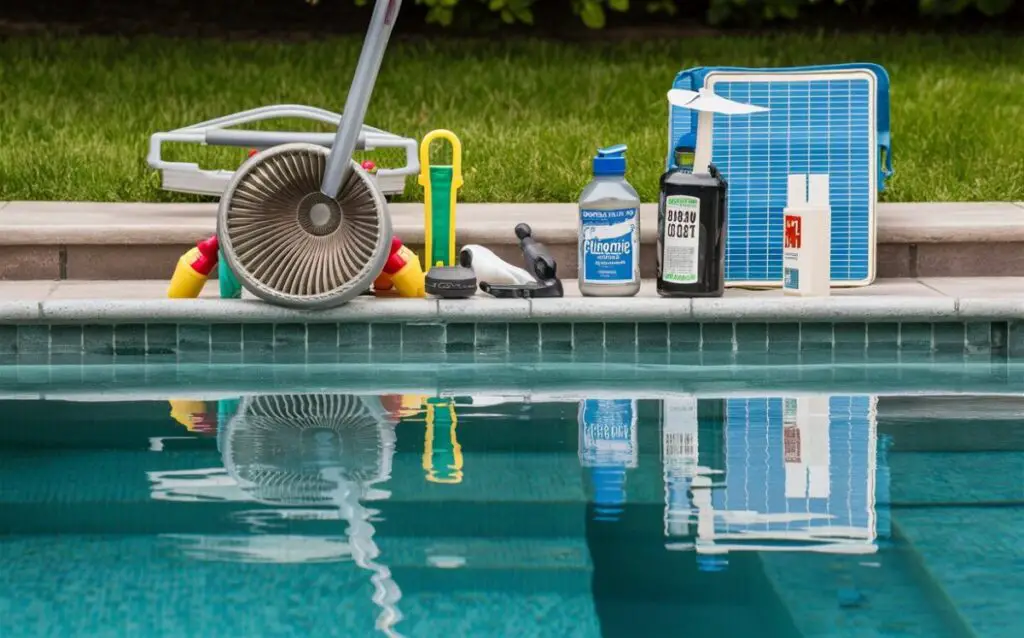
Conclusion
In conclusion, being aware of the possible risks that pool algae may present to people is essential for appropriate pool maintenance.
Proactive prevention, prompt maintenance, and a commitment to maintaining a safe swimming environment are the foundation of a spotless pool.
Regular water quality monitoring, appropriate chemical balance, and cleaning techniques are essential in order to stop algae growth.
Algaecides, prompt debris removal, and effective circulation can make swimming safe and enjoyable.
Pool owners who prioritize these procedures not only protect swimmers’ health, but they also increase the longevity of their pool’s infrastructure.
FAQs
Is pool algae only a cosmetic issue, or can it harm my health?
Pool algae is not just a cosmetic concern; it can cause skin irritation, respiratory issues, and allergic reactions, posing significant health risks.
Can chlorine alone prevent pool algae growth?
Contrary to popular belief, relying solely on chlorine may not be sufficient. Proper pool maintenance, including circulation and sanitation, is crucial.
How quickly should I address pool algae once I notice it?
Swift action is recommended. Timely treatment can prevent further growth and save on the on the costs associated with extensive remediation.
Are all types of pool algae the same?
No, different types of algae have distinct characteristics and may require specific treatment approaches.
Can pool algae affect the environment beyond the pool?
Yes, pool algae infestations can lead to water waste, chemical runoff, and negative impacts on local ecosystems.
Hooked on Tech: Exploring the latest Fishing Gadgets that Anglers swear by.
In the realm of angling, where tradition and technology often converge, a new wave of fishing gadgets has emerged, transforming the way anglers approach their craft.
From advanced fish finders to smart bait systems, these innovations have not only revolutionized the fishing experience but have also garnered a loyal following among anglers worldwide.

